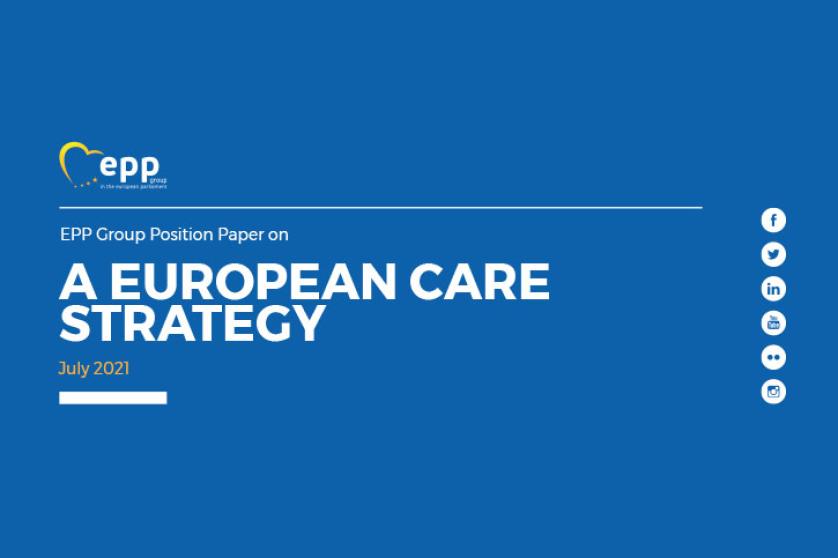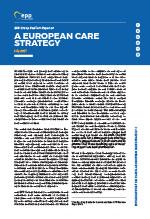EPP Group Position Paper on a European Care Strategy

Across Europe, the giving and receiving of care is a constant, close to the heart of many Europeans. Families and neighbours supporting and providing care around the clock to those who require it, from children to persons with disabilities and/or long-term illnesses and older persons. Each and every one of us has been cared for at some point in our lives, and will likely care for someone else too. This is a hallmark of our societal contract, through generations. Investment in care is not just a moral necessity, in line with the European way of life, but significantly contributes to societal good, including to cohesiveness and a sense of family and belonging, and allows for positive development of both those who are cared for and those who care.
Yet, there are different care models in Europe which continue to develop and change, matching the realities and challenges of modern life. The COVID-19 pandemic shone a light on the provision of care and support services, highlighting that the sector is underfunded and understaffed, both in formal and informal settings. The pressures of caring and on carers and families became clear, and the realisation of the need for change was notable, across our entire European society. Coupled with major demographic developments and the ever-advancing role of women in society, the care sector in many European countries requires significant investment and reform. An ongoing debate is now required, prioritising work life balance to ensure a good quality of family life, consideration of women as carers and ensuring the best possible quality of care for all those who require it.
The EPP Group believes in the power of the individual and their families to choose a care path that is best for them, supported by their family, friends and neighbours, and medical and social professionals too. We are unequivocal in our respect for the right to self-determination and autonomy of those who require care or support. It is our conviction that each carer and person who requires care know what is best for them given their unique circumstance, and support should happen at the closest level to the individual, whether that is local, regional or national, depending on the national context. However, there can be a unique European benefit through action at European level in select areas, complementing Member State actions and in line with the principle of subsidiarity. We acknowledge the benefits of our European Union’s high social protections standards including in care, with equal opportunities for all. The EPP Group seeks to harness this added value, based on the European Pillar of Social Rights, to use the best of what the European Union is and has to support carers and those who are cared for. As such, the EPP Group calls for a European Care Strategy, both to support carers in their work and to ensure that those receiving care or needing support are best provided for.
While a European Care Strategy would offer a framework approach, taking into account commonalities between all types of care, in reality separate and specific actions will be needed for each individual type of care. Nevertheless, synergies between individual actions will be crucial, further building and consolidating intergenerational understanding and a positive approach to ageing and social inclusion. In addition, care policies and ageing policies should be well aligned, and take into account demographic developments, while harnessing the value of the silver economy.
Notably, informal carers require unique and specific consideration given their largely unrecognised and unremunerated roles. The EPP Group acknowledges the specificities of this group of carers, and highlights the need for personal and societal recognition of the crucial role they play and the essential contribution that these women, men and indeed children make within our societies.
What?
While the legal responsibility and competence for social policies mainly lies with the Member States and while the implementation of adequate reforms of care systems needs to take place at the national level, a more wide-ranging discussion at the EU level can make a solid contribution to the development of common approaches, and can complement national efforts.
Considering that workers in the care sector are highly mobile within the European Union, a common European approach in addition to Member States policies could create an important added value.
The provision of care is complex and multifaceted , varying greatly across the EU and resulting in a rich and diverse landscape: there are different systems for offering care in different Member States, differences in the quality of the care provided (within and between Member States, between private and public settings, urban and rural areas, different age groups), fragmented and incomparable data, a varied approach to who is responsible for carrying out caring responsibilities and differences in the understanding of the role of the state. Yet there are also many similarities.
Changing demographic patterns across the EU presents challenges for the future of caring, with an aging society living longer with complex health needs, a falling birth rate and consequently the decline of the working age population combined with the lengthening of working life. This subsequently puts further pressure on public expenditure. However, greater activation of women in the labour market offers the opportunity to bolster women’s economic independence, meaning lower unemployment costs for the Member States and social policy dependency. In addition, there is the potential for up to 8 million job openings in the health and social care sector in the next 10 years, creating new economic opportunities and boosting growth and employment As care work requires skills such as empathy and personal relations, these jobs are unlikely to be affected by automation, future-proofing the sector. By furthering developing the care sector, there is potential to suitably respond to the needs of society.
In addition, across Europe, due to perception and cultural norms, women are responsible for the majority of caring duties, often as so-called “sandwich carers”, creating a “care gap” that contributes greatly to the gender employment gap. Caring for children or relatives is named by women in the EU as the most common reason for reducing working hours or withdrawing from the labour market. In addition, horizontal and vertical segregation of the labour market is exacerbated, with women taking short-term, part time or precarious, and even informal employment, that can be adapted to a caregiving schedule, directly affecting their short and long-term earnings and contributing to the gender pay gap. As such, this reduces the level of taxes paid to Member States, and means lower contributions to pension funds. This is coupled with additional expenditure in the form of welfare benefits and healthcare costs. In the long-term particularly, such career choices profoundly affect a carer’s economic independence in old age, affecting the gender pension gap and the risk of poverty.
Finally, independent living and the freedom to live as long as possible in the home should be an aspiration and a goal available to all citizens. To date, care in institutional settings has often been the norm in certain Member States, and is still very prevalent across the European Union. Yet a shift to local care, supported by state services where necessary and medical and social care professionals has begun. As EU Member States and the Union as a whole consider the future of care services and what is needed, consideration of how to best support individuals to remain in their homes as long as possible is needed. Advances in digitalisation and digital health tools can help to facilitate independent living.
How?
While the work of carers has been highlighted through the COVID-19 pandemic, in reality, carers have been supporting and caring for their families, friends and neighbours for generations. Their everyday reality and the responsibilities that they own exemplifies the best of Europe. All formal and informal carers deserve more than applause. Therefore, the EPP Group calls for:
- A European Care Strategy, with a strong gender dimension, that takes a holistic and life-long approach to care while envisaging specific measures and actions for both carers and those who receive care both in the formal care sector and informally within the home. The Strategy should take into account the Gender Equality Strategy and European Disability Strategy, amongst others, and should complement the actions of Member States with due regard to subsidiarity. It would tackle the provision of care holistically and aim to improve the cooperation and coordination of all funds and measures beneficial for the European carers and the people they care for. In addition, it will aim to boost the labour market participation of women, and ensure long-term strategic investment for those who need of care and their carers.
Such a strategy should include:
Data
-
The collection of regular, comprehensive and publically accessible data on the situation of carers and those who are cared for (children, older persons and persons with disabilities), disaggregated by gender, age, the type of care provided or received, and the setting in which it takes place (private or public). This would serve as a basis for the strategy. In addition, such EU wide data collection could form the basis for an indicator on care in the future.
-
An EU-wide study to assess the needs of carers in each Member State, with the aim of agreeing on a clear and wide-ranging definition of formal and informal care.
Gender Equality and Work-life Balance
-
Research into the economic value of care, taking into account the cost of women’s reduced employment or withdrawal from the labour market and its effects in reducing the gender pay gap.
-
The adoption by all Member States of effective work-life balance policies to further preserve family life, with the Work-Life Balance Directive, which sets European minimum standards for care, paternity and parental leave, as the basis. Correct transposition and implementation of the Directive should be monitored closely.
-
A proposal for a Council recommendation on provision of care.
-
Member States to examine and exchange best practice on how best to support societal groups with particular care needs, including single parents, parents with children with serious illnesses such as cancer and children with disabilities.
-
Member States to consider and exchange best practice on how to reflect periods spent on care responsibilities in pension schemes, with a view to reducing and eventually closing the gender pension gap.
Care & Employment
-
Targeted upskilling and reskilling of workers to take account of growing employment potential in the care sector, using the European Skills Agenda, the Pact for Skills, ESF+, the Youth Employment Initiative, the Just Transition Fund, and EU4Health, among others.
-
Recognition of the skills of carers through a certification process, to improve their access to training, information and advice about care, caring and adequate care-life balance measures at Member State level, allowing for the advancement of mutual recognition of skills. Such a system could take into account the European Credit Transfer and Accumulation System (ECTS).
-
Measures to tackle informal care through formalisation and recognition at Member State level, promoting access to social security systems, further advancing the prevalence of carers leave, recognition of skills and possibilities for career development. Work-life balance and respite services for both the carer and the person requiring care are essential. For public revenue purposes, Member States should examine how best to formalise employment and therefore revenue collection in this area, including tax deduction systems and the use of service vouchers.
-
Measures to protect the occupational health and safety of carers.
Use of EU Funds
-
All Member States to facilitate the creation of modern, high-quality, and local infrastructure, services and caregivers for quality early childhood education and childcare, and care for older persons, persons with disabilities and/or long-term illnesses. Such services must be available, accessible and affordable, taking into account geographical and demographic realities.
-
The promotion of investment of EU funds, including the Recovery and Resilience Facility, EU4Health Programme and European Structural and Investment Funds (ESIF), in care infrastructure, as frequently highlighted as necessary through Country Specific Recommendations. EU spending on care should be monitored and evaluated;
-
The exploration of new models of care, combining multigenerational and socially inclusive projects such as the provision of care for children, persons with disabilities and older persons, and for Member States to consider such pioneering approaches.
-
Utilising digital solutions to their full capability to support those requiring care to live independent and autonomous lives, including providing tailored health and person-centred care through suitable tools, as well as quality data to share and advance research and treatment across borders.
Targets
-
The adoption of a Council Recommendation on the Child Guarantee.
-
The revision of the Barcelona targets, and for EU funds to be made available to achieve them.
-
EU-wide targets for long term care services, to be elaborated by all Member States. These would be similar in style and structure to the Barcelona targets.
-
A common European definition of informal care, based on best practice sharing, with possibilities for its formalisation.
-
Calls on the European Commission to consider the effectiveness of necessitating that public procurement of social care services be beholden to the obligations of the Public Procurement Directive, as the rate of cross-border procurement continually remains very low despite efforts to further open the market.
-
The development of Common European Guidelines on the Transition from Institutional to localised Care and of the Toolkit on the Use of European Union Funds, with the Commission serving as a platform for best practice sharing on evidence-based, innovative solutions, new models and tools for care delivery, promoting social inclusion and multi-generation understanding.
Other related content

6 / 54





